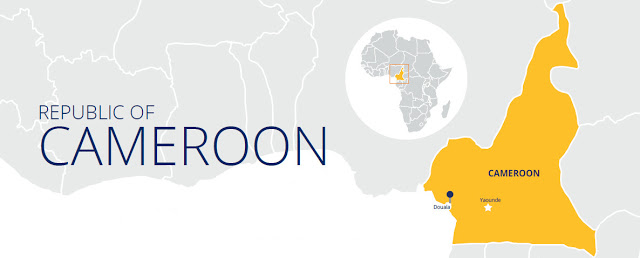One of our Mercy Ship women is working to create a web page for the orphanage. Although it's not complete as I write this, here is a link to the page for further background.
God Is Love Orphanage
I was told this was typical of houses in the area (although perhaps on the large size since it holds so many people). It's nicer than most houses in Conakry. When they moved in, there were no windows or doors, so Michael added these to the house. Off the large room is a hallway which leads to a couple of bedrooms containing bunk beds for the kids. There are no shelves, closets or dresser to put anything. There are no sheets on the beds, just mattresses, but their is a good roof and windows with screens.
There was a gas refrigerator in the garage area, but it wasn't working.
They have a water supply, that they treat to purify it (I believe with chlorine). A neighbor has dug a well, so hopefully they can connect to a closer water supply.
Outside the living area, is a back door. About one meter away is another small building which has the pastor's study. Around the corner is a small room for the kitchen and beyond that an outhouse.
The kitchen has places on the ground where they can build three charcoal fires for cooking.
While the children's program was taking place the men were meeting with Michael and another pastor who was also one of our drivers. After our time together, we walked down the street to the markets and bought some food. There is one local shop that the team goes to each week for food supplies, then down the street to buy 30 loaves of bread.
We brought the supplies back to the orphanage. From what I observed, most of the diet is white bread and mayonnaise supplemented on occasion with a little meat or fish.
One of the girls is suffering from sickle cell anemia. In this part of the world, life expectancy is not long for most people with sickle cell anemia. There are some local treatments, but health care is not very available. There is not a good blood supply.
When one sees these needs, and develops relationships with people living in these conditions, how do you respond? I find that I have more questions than answers. As I was pondering these questions, I read the account of Jesus feeding the 5000. He told His followers "You give them something to eat."
I don't think Jesus worried about creating an unhealthy dependency on those He fed. He simply met the need.
In the West, we easily suffer from compassion fatigue. We can all site examples of giving to a charity and nothing ever seems to change. Governments around the world have pumped billions of dollars into Africa - most doesn't get to where the needs are, and nothing really changes. Is it helpful or hopeless?
On a local level, a lot of good can be done to give hope and healing to people. To impact lives positively for many years requires discernment and compassion. For those seeking to follow Jesus, it requires prayer, listening, and a little courage to reach out.
One week after our outing, two land rovers of people from this ship arranged to meet Michael, his family and the orphans at a park with a playground for the kids. This is something the kids had asked about. The night before we had a sandwich making party. Debbie and I specialized in Peanut butter and jelly sandwiches, while others made cheese or mayonnaise sandwiches. Others made some cupcakes and others brought some other snacks.
We met at the Jardin du 02 Octobre. The park was built commemorating the independence from France in 1958. It's a lovely place. The entrance fee is about $0.75 per person. It's the cleanest place I've seen with lots of shade trees, and lots of playground equipment for the kids to climb and play on.
 |
| Some of our group at the park |
Here's an example of one of the slides. It is made of concrete with a smooth polished stone slide. It's indestructible, does not get hot and gives a place for lots of kids to have fun. There is a bit of a Disney theme throughout the park.
This slide was a lot of fun for kids to go down together, but the landing took a sharp turnup. This is why they are made for the young.
The kids really enjoyed going on a ride like this. We heard lots of laughter and saw a lot of smiles.
Here I am with my friend Pastor Michael. Michael is from Sierra Leone. We had some great conversations. Not only does he pastor a church, but he started a school which now has over 300 students and of course cares for over 20 orphans.
Finally we had to leave for the day. Those from Mercy ships fit nicely into two Land Rovers, while Michael had 25 people in his van. In Africa, there's always room for one more.
Notice the nice traveling clothes! They had to act a little goofy for this picture.
We had a wonderful day, brought some joy into many lives, deepened friendships both on the ship and off ship, and left grateful to have this special day in Conakry, Guinea.
Chuck

































